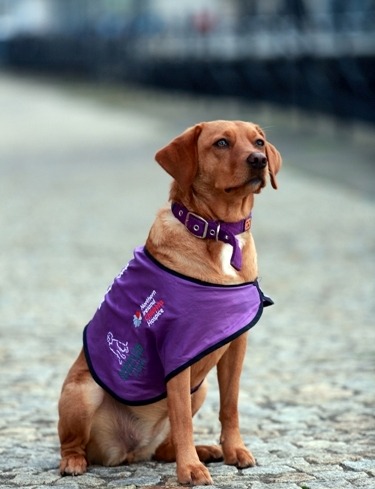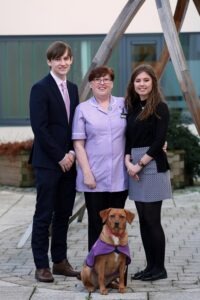Baker Tilly Mooney Moore is championing the benefits of pet therapy by sponsoring Northern Ireland Hospice’s therapy dog for the second year running.
Matthew Stubbs & Adrien Pelan with Rose Henderson of the NI Hospice & Darcey
Darcey, a two-and-a-half-year-old Labrador/Red Setter cross, joined the Hospice care team last year and has been welcomed by staff and patients alike because of the physical and emotional benefits she brings.
Dogs are regularly used in pet therapy for their compassionate presence and ability to read subtle physical and emotional signals from people. Studies have shown that petting an animal can reduce anxiety, lower blood pressure and ease depression as well as encourage ‘feel good’ hormones including serotonin and oxytocin to be released – all of which are beneficial to Hospice patients.
Students on Baker Tilly Mooney Moore’s apprenticeship programme, Adrien Pelan and Matthew Stubbs, visited Darcey to see her in action and meet Rose Henderson, creative therapist nurse at Northern Ireland Hospice.
Rose said: “Pet therapy has huge health benefits for patients while simultaneously giving them enjoyment and stress release. Darcey has been such a positive addition to the Hospice team, providing comfort and reassurance to patients while they are receiving treatments. Her presence can really help them relax and regulate their breathing.
“We very much appreciate Baker Tilly Mooney Moore’s support of Darcey which is making such a positive contribution to the lives of patients at the Hospice.”
Adrien added: “It was amazing to see Darcey at work – she knows she must be calm, responsive and approachable and her presence is the perfect asset to assist nurses and doctors in helping to make patients comfortable. She is a fantastic dog and contributes so much to the NI Hospice. Baker Tilly Mooney Moore is proud to support the incredible work of the Hospice for a second year.”
Northern Ireland Hospice offers specialist respite, symptom management and end of life palliative care to over 3,500 infants, children and adults each year across Northern Ireland.


